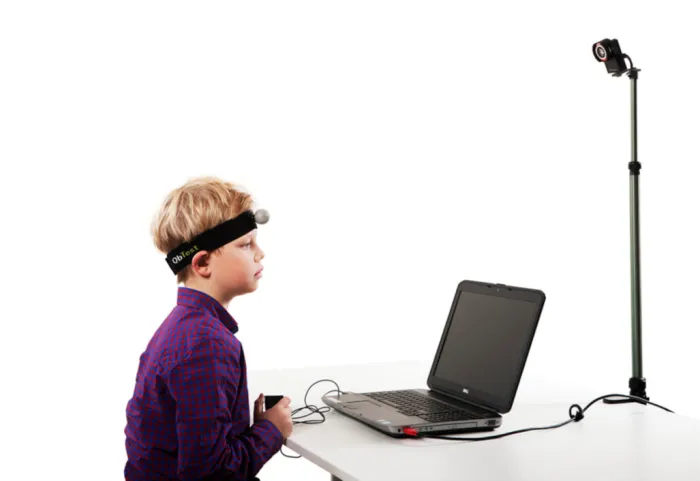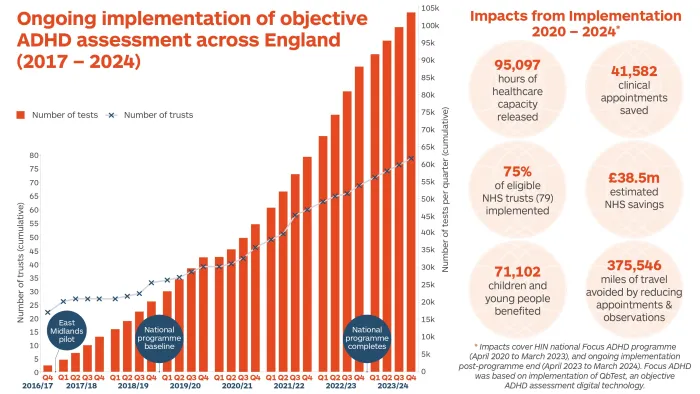
Rapid national rollout of QbTest – developed by innovator Qbtech – has been based on a successful collaboration between the company, Health Innovation Network, the National Institute for Health and Care Research (NIHR) Applied Research Collaborative East Midlands (ARC) and the NIHR MindTech HealthTech Research Centre.
QbTest, recommended in 2024 by NICE to help diagnose ADHD in children and young people, is a computerised assessment tool that measures all three core components of ADHD (attention, impulsivity, and activity).
ARC East Midlands (formerly CLAHRC East Midlands) evaluated the effectiveness of QbTest during a randomised controlled trial (delivered by NIHR MindTech HRC) between 2014 to 2018; this found that when used to supplement clinical assessment the time to diagnosis was reduced by an average of 153 days.
Building on the success of the ARC and MindTech research, Health Innovation East Midlands (HIEM) piloted the technology within three East Midlands NHS mental health Trusts, which showed the potential to both cut the time to diagnosis and achieve significant cost savings by reducing the appointments needed to reach diagnosis and so freeing up clinician time.
The ARC, MindTech and HIEM collaboration provided the evidence base for wider adoption by England’s 15 Health Innovation Networks (HINs) and in 2020 the QbTest was rolled out across England via the network of 15 health innovation networks (formerly the AHSNs).
The technology rapidly gained traction and by March 2024 the outstanding national impacts included:
- 95,097 hours of healthcare capacity has been released across the NHS.
- 41,582 clinical appointments have been saved.
- 71,102 children and young people have benefited.
- 79 NHS trusts are now using the technology, three quarters of all English trusts that provide ADHD services.
- £38.5 million estimated NHS cost savings have been achieved.
The visual below represents the ongoing implementation of the objective ADHD tool across England. Click on the image to view it in full screen for a clearer perspective.

Nicole McGlennon, Managing Director of Health Innovation East Midlands, said: “This is an example of the fantastic results of close and effective collaboration between research and innovation partners – working together to build an evidence base and then drive implementation of technologies that transform patient outcomes and generate NHS savings.
“From our East Midlands pilot across three local NHS trusts, within a couple of years via the 15 Health Innovation Networks we are getting closer to achieving close to 100 per cent implementation across the NHS, benefiting many children and young people and saving valuable NHS resources.”
This is a clear example of how partnership-driven innovation can lead to more efficient and effective healthcare solutions.
Professor Kamlesh Khunti, Director of NIHR ARC East Midlands and Professor of Primary Care, Diabetes and Vascular Medicine at the University of Leicester, said: “QbTest has revolutionised ADHD diagnosis for children and young people by offering an objective assessment tool that measures all three core components.
“Made possible through the collaboration between HINs , NIHR ARC East Midlands and NIHR MindTech HRC, this innovation has significantly reduced the time to diagnosis, providing families with quicker and more accurate assessments.”
He added: “This is a clear example of how partnership-driven innovation can lead to more efficient and effective healthcare solutions.”
Professor Richard Morriss, NIHR ARC East Midlands Mental Health and Well-being Theme Lead and Professor of Psychiatry at the University of Nottingham, said: “From a clinical perspective, QbTest has allowed clinical services to reach a diagnosis of ADHD or other explanations for their symptoms more quickly and with greater confidence.
“These services are in massive demand from the NHS, so this technology is needed more than ever before.”
He added: “With a series of projects supported by the NIHR starting with ARC East Midlands who funded and conducted the original trial in close collaboration with Qbtech, and later work from NIHR MindTech as well as support from the NIHR Nottingham Biomedical Research Centre, we then established work with HIEM, leading to its national use and NICE approval now.
“This ability to collaborate across these partners with consistency over time has made all the difference.”
Tony Doyle, Qbtech Commercial Director, said: “It would not have been possible to grow and expand so rapidly throughout every NHS region in England without our groundbreaking partnership with Health Innovation East Midlands and the East Midlands ARC.
“Between them, they have tremendous expertise at health and care research and implementation, and this was critical to quickly building an evidence base for rapid adoption – without their support it would have taken many more years to get where we are today.
The East Midlands partnership was a key of the jigsaw that has enabled us to benefit so many children and young people globally.”
For more information visit www.Qbtech.com or the HIEM webpage.
